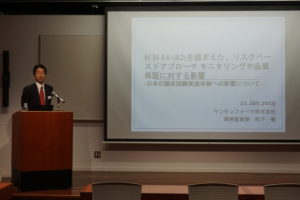5th Seminar Report :Risk-Based Approach Based on ICH-E6 (R2)
-The Effects on Monitoring and Quality Assurance System-
The 5th Academia Clinical Development Seminar in 2018FY was held on Friday January 11th at the multi-media hall, Osaka University Hospital. We welcomed Mr. Satoshi MATSUSHITA from Janssen Pharmaceutical K.K. as a lecturer with a title of “Risk-Based Approach Based on ICH-E6 (R2) -The Effects on Monitoring and Quality Assurance System-”. Mr. MATSUSHITA has worked for mainly as a monitor for a long time since 1989, and then he is working as an audit in his company. Simultaneously, he has been working as a member of the Pharmaceutical Evaluation Committee of the Japan Pharmaceutical Manufacturers Association (JPMA) since 2004, focusing on the regulations as his activity including guidance of ICH-GCP or GCP etc.

An environment including sample size and complexity for conducting clinical trials has been dramatically changed over the last two decades since ICH-E6 (R1) has been issued. A revision of the ICH-E6 (R2) started in 2013. As of November 2016, that was reached to Step 4. The revision process is disclosed through the website. It is expected that the revision will be finalized as step 5 in 2018 fiscal year in Japan. Notably, this revision was not amendment, but addendum. The revision may impact not only in Japan, but also all over the world. Based on these background, he focused on risk based approach that was newly added as the addendum. He kindly and politely explained how we maintain data quality in conducting clinical trials in Japan.
First of all, he explained about technical terms that have been revised since over the two decades such as Certified Copy, Monitoring Plan, and Validation of Computerized System, He also talked about difference in definition and its responsibility between investigators and sponsor that are often confused for Japanese investigators, and introduced Risk based Quality Management System (QMS). As for ICH-E6 (R2), he categorized 6 components including 1) Organization/System (2) Clear Process (3) Issue Management (4) Record and Storage (5) Risk Management (6) Cooperation with Outsource. We need clearly and comprehensively to understand current status and issues for these components. Then we need to recognize an importance to prioritize issues that are needed to be revised in each component.

Recently, we often hear that there are abstractive descriptions of risk analysis and risk management in various field and “No one knows who does what specifically”. In this regards, there are two important things when we develop new drugs; 1) patient protection and 2) data reliability. In order to conduct optimal development with a consideration of risk assessment, Academia, ARO, needs to construct infrastructure being able to perform relevant risk analysis, he mentioned. Consequently, he concluded his lecture describing that principal investigators need to handle clinical trial with a deep consideration, because Japanese society does not fully establish “risk analysis” yet.
After the lecture, he answered many inquiries politely and ended it on a high note.


